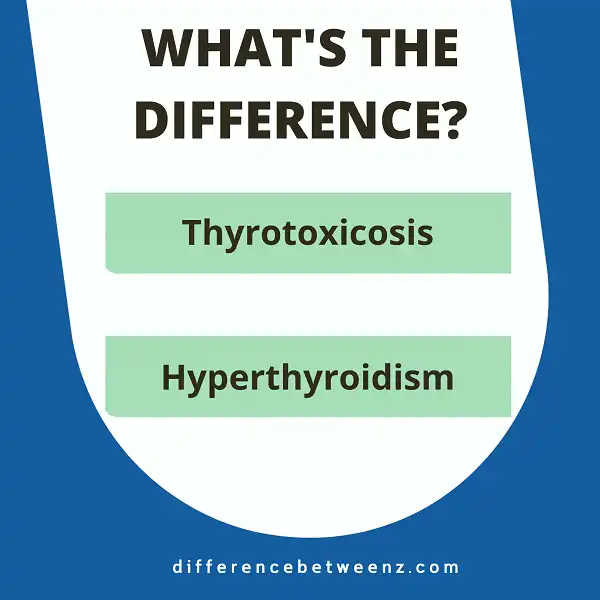Thyrotoxicosis and hyperthyroidism are both conditions that arise from an excess of thyroid hormones in the body. However, they are not the same condition. Thyrotoxicosis is a term used to describe all conditions that result from too much thyroid hormone, while hyperthyroidism specifically refers to a condition where the thyroid gland is overactive. There are several different causes of thyrotoxicosis, while most cases of hyperthyroidism are due to Graves’ disease. While the two conditions share many similarities, there are also some important differences between them. In this blog post, we will explore the key differences between thyrotoxicosis and hyperthyroidism.
What is Thyrotoxicosis?
Thyrotoxicosis is a condition that results from excess thyroid hormone in the blood. Thyroid hormone plays an important role in regulating metabolism, and when levels are too high, it can lead to a number of symptoms including weight loss, increased appetite, sweating, anxiety, and irregular heartbeat. Thyrotoxicosis can be caused by a number of conditions including Grave’s disease, toxic multinodular goiter, and Thyroiditis. Treatment typically involves beta blockers to control the symptoms and antithyroid medication to slow down thyroid hormone production. In some cases, surgery may also be necessary to remove part or all of the thyroid gland. With proper treatment, most people with thyrotoxicosis can manage their symptoms and live a normal life.
What is Hyperthyroidism?
Hyperthyroidism is a condition that occurs when the thyroid gland produces too much thyroid hormone. This can cause a number of symptoms, including weight loss, rapid heart rate, and anxiety. Hyperthyroidism is often treated with medication or surgery. In some cases, radioactive iodine may be used to destroy the overactive thyroid cells. Hyperthyroidism can be a difficult condition to manage, but with treatment, most people are able to live normal, healthy lives.
Difference between Thyrotoxicosis and Hyperthyroidism
Thyrotoxicosis is a condition caused by an overactive thyroid gland, resulting in the production of too much thyroid hormone. The most common cause of thyrotoxicosis is Graves’ disease, an autoimmune disorder that attacks the thyroid gland. Thyrotoxicosis can also be caused by excessive iodine intake, certain medications, or certain medical conditions. Symptoms of thyrotoxicosis include weight loss, anxiety, irritability, insomnia, and heart palpitations. If left untreated, thyrotoxicosis can lead to serious complications such as heart failure or psychosis.
Hyperthyroidism is similar to thyrotoxicosis in that it is also caused by an overactive thyroid gland. However, hyperthyroidism refers specifically to the increased production of thyroid hormone. The most common cause of hyperthyroidism is Graves’ disease, but it can also be caused by benign tumors on the thyroid gland or certain medications. Symptoms of hyperthyroidism include weight loss, anxiety, irritability, insomnia, and heart palpitations. If left untreated, hyperthyroidism can lead to serious complications such as heart failure or psychosis.
Conclusion
Thyrotoxicosis and hyperthyroidism are both conditions that occur when the thyroid gland produces too much thyroxine. However, there is a big difference between these two conditions. Thyrotoxicosis is a condition caused by an excess of thyroid hormone in the blood, while hyperthyroidism is a condition caused by an overactive thyroid gland. If you are experiencing symptoms of either condition, it’s important to see your doctor so they can diagnose you and prescribe the appropriate treatment.


